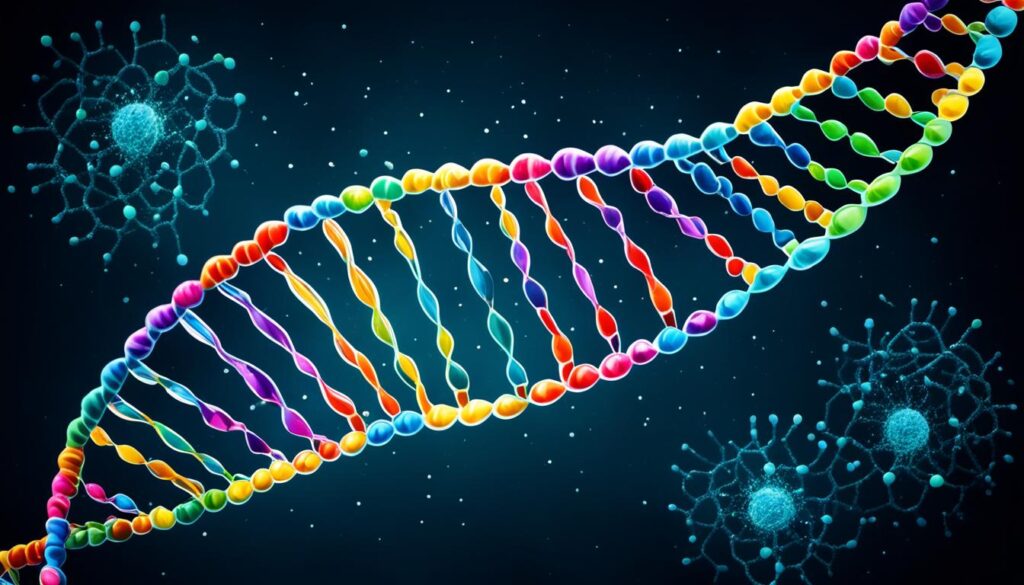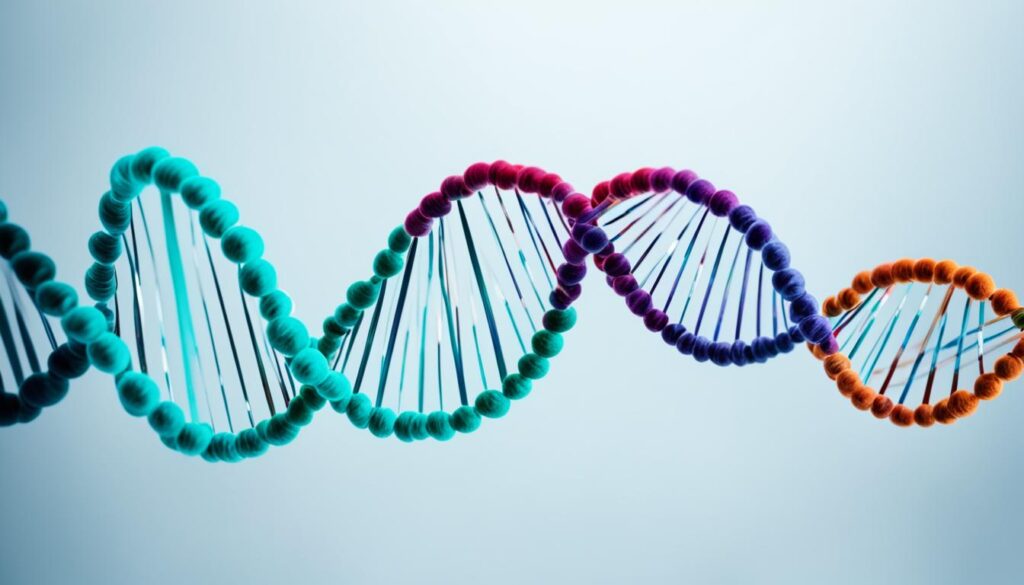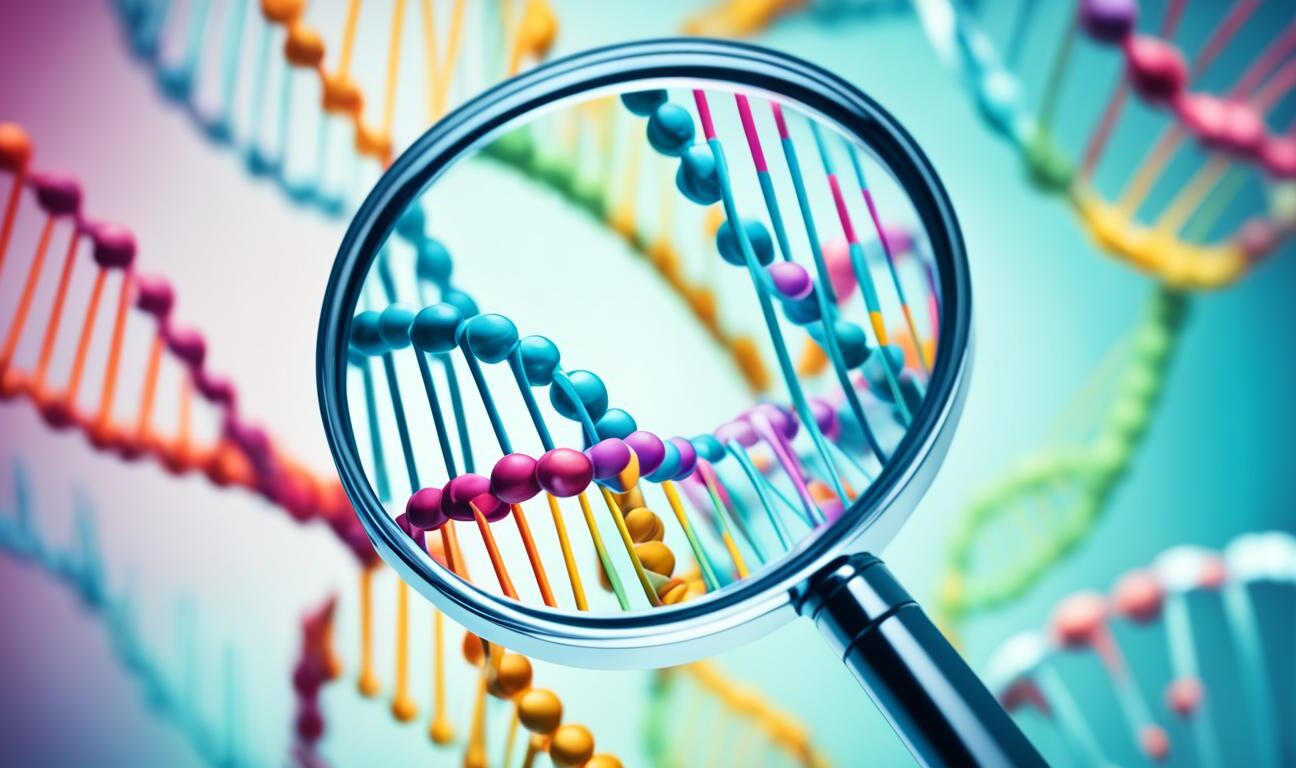Genetic testing is now a key tool in today’s fast-paced science world. It lets people see the detailed workings of their DNA. By looking at specific genetic markers, this tech opens a door to understanding a person’s health, family history, and risk for certain conditions.
It’s changing how we see ourselves and the world. Genetic testing helps find hereditary disorders and trace our family lines. This makes us understand ourselves and our history in new ways.
Table of Contents
Key Takeaways
- Genetic testing provides valuable insights into a person’s health, ancestry, and genetic predispositions.
- It can help identify risk factors for hereditary disorders and enable preventive measures.
- Gene sequencing and personalized medicine offer tailored treatment plans based on an individual’s genetic profile.
- Ancestry tracing through DNA analysis can uncover one’s familial roots and heritage.
- Prenatal screening and genetic counseling empower expectant parents to make informed decisions.
Understanding Genetic Testing
Genetic testing is a key medical tool that lets us explore our DNA deeply. It shows us our health, ancestry, and risks for certain conditions. This tech is changing how we use personalized healthcare and prevention.
What Is Genetic Testing?
It’s about looking at our DNA to find genetic changes or patterns. These can tell us about our health, family history, and more. The tests help with diagnosing diseases and predicting health risks.

Types of Genetic Tests
There are many kinds of genetic tests, each for different reasons. Here are some common ones:
- Diagnostic tests: These find genetic disorders or conditions.
- Predictive tests: They show the risk of future genetic conditions.
- Carrier tests: These check if someone might pass on genetic traits to their kids.
- Pharmacogenomic tests: These look at how genes affect how we react to medicines.
- Ancestry tests: These show our genetic roots and where our ancestors came from.
Thanks to gene sequencing and data analysis, genetic testing has grown a lot. It now offers many chances for personalized healthcare and new discoveries.
“Genetic testing is not just about identifying genetic disorders; it’s about empowering individuals to take control of their health and make informed decisions about their future.”
| Type of Genetic Test | Purpose |
|---|---|
| Diagnostic | Identify genetic disorders or conditions |
| Predictive | Look at the risk of future genetic conditions |
| Carrier | See if someone might pass on genetic traits to their kids |
| Pharmacogenomic | Understand how genes affect our response to medicines |
| Ancestry | Reveal our genetic background and family history |
Benefits of Genetic Testing
Genetic testing changes healthcare for the better, offering many benefits for people and their health care. It lets us understand our DNA, leading to personalized medicine. This means finding health issues early and helping people prevent and manage diseases.
One big plus of genetic testing is spotting genetic risks for health problems. With this info, people can get checked early. This can make treatments work better and help prevent some diseases.
It also helps make medicine more personal. Doctors can create plans that fit what your genes say. This leads to better health care, making patients’ lives better.
Genetic testing lets people take charge of their health. Knowing your genes helps you make smart choices about your life and health. This can lead to better health and lower disease risk.
“Genetic testing is a powerful tool that can revolutionize the way we approach healthcare, paving the way for personalized medicine and preventive measures that can significantly improve health outcomes.”
Genetic testing has many benefits, like finding diseases early and making treatments more personal. As technology gets better, genetic testing will keep changing healthcare. It will help people take control of their health and well-being.
Genetic Testing for Hereditary Disorders
Genetic testing is a key tool for dealing with hereditary disorders. These are conditions that run in families because of certain genetic changes. Knowing about these risk factors lets people watch their health closely and prevent problems.
Identifying Risk Factors
Genetic tests show if someone might get certain diseases like some cancers, Huntington’s disease, or cystic fibrosis. Doctors look at your genes to see if you have traits linked to these conditions. This helps them start early checks and screenings.
Preventive Measures
With genetic test results, people can lower their risk of getting hereditary disorders. Here are some steps they can take:
- Regular screening and monitoring through medical check-ups and diagnostic tests
- Adopting lifestyle changes, such as a healthier diet and increased physical activity
- Exploring preventive surgical options, where appropriate, to reduce the risk of developing certain conditions
- Seeking early intervention and treatment, if necessary, to manage the condition and improve long-term health outcomes
By being proactive, people with a higher risk can manage their health better. They work with doctors to create plans for prevention and early action.
| Hereditary Disorder | Genetic Risk Factors | Preventive Measures |
|---|---|---|
| Breast Cancer | BRCA1 and BRCA2 gene mutations | Regular breast cancer screening, risk-reducing surgery, lifestyle changes |
| Huntington’s Disease | Expansion of the huntingtin (HTT) gene | Genetic counseling, regular medical check-ups, planning for the future |
| Cystic Fibrosis | Mutations in the CFTR gene | Early diagnosis, specialized medical care, airway clearance techniques, and nutritional support |
“Genetic testing can be a powerful tool in the early detection and prevention of hereditary disorders, empowering individuals to take control of their health and well-being.”
Gene Sequencing and Personalized Medicine
Advances in gene sequencing and genetic analysis have led to personalized medicine. This new approach customizes treatment plans to fit an individual’s unique genes. It brings unmatched precision and effectiveness to healthcare.
Knowing a person’s genes helps doctors create targeted therapies. They can adjust drug amounts and use precision-based interventions. This change could transform how we handle many health issues, like cancer and chronic diseases.
Tailored Treatment Plans
Gene sequencing in healthcare lets doctors spot genetic signs linked to diseases. With this info, they craft tailored treatment plans that hit the disease’s core. This leads to more effective and personalized care.
- Therapies based on genes can make treatment work better, cutting down on bad reactions and boosting patient results.
- With precision, doctors can adjust treatments to fit each person, getting the most benefits and fewest side effects.
- Personalized medicine lets patients take charge of their health, making choices based on their genetic details.
As gene sequencing and personalized medicine grow, healthcare’s future looks more precise and suited to each person. This marks the start of a new era of precision healthcare.

Ancestry Tracing with DNA Analysis
Exploring your family’s past is now easier with DNA analysis. This technology lets you trace your genetic roots. It reveals information about your ancestry, ethnic heritage, and cultural identity.
By comparing your DNA to others from around the world, you can learn about your diverse origins. This helps you understand the journeys of your ancestors. DNA analysis is a powerful tool for exploring your genealogy and discovering your ethnic heritage.
The insights from DNA analysis can change how you see yourself and your culture. It helps you reconnect with your roots and discover hidden stories. You’ll gain a deeper appreciation for your ancestral heritage.
“Discovering your family’s past through genetic testing is like unlocking a door to a world of endless possibilities. It’s a journey of self-discovery that can profoundly shape your understanding of who you are and where you come from.”
Whether you’re curious or want to connect with your roots, tracing your ancestry with DNA analysis is transformative. Start this adventure and discover the secrets in your DNA. You’ll learn the extraordinary stories that shape who you are.
| Benefits of Ancestry Tracing with DNA Analysis | Key Features |
|---|---|
|
|
Prenatal Screening and Genetic Counseling
Being pregnant can be both thrilling and overwhelming. Luckily, genetic testing is key in this journey. It helps doctors check for genetic disorders and congenital abnormalities during pregnancy. With genetic counseling, parents can make smart choices and be ready for parenthood.
Preparing for Parenthood
Prenatal screening tests can spot genetic or chromosomal issues early, like Down syndrome or cystic fibrosis. These tests give parents important info. They let parents talk with their healthcare team about what it means and what options they have.
Genetic counseling goes hand in hand with these tests. It offers support and advice. Experts help parents understand test results, talk about risks, and make tough decisions. This way, parents can welcome their child with confidence and know about their genetic health.
“Genetic testing and counseling empower expectant parents to make informed decisions and prepare for a healthy, informed parenthood experience.”
By using prenatal screening and genetic counseling, parents can better understand their child’s health during pregnancy. This helps them feel more ready and confident. It’s a complete way to care for the pregnancy and prepare for parenthood.

Genetic testing
Genetic testing has changed how we see the human genome. It has opened new doors in healthcare, personal discovery, and legal cases. It helps find genetic markers linked to health issues and can prove who a father is through DNA analysis. This field is growing fast, making genetic tests more useful and easy to get.
Genome mapping is a big part of genetic testing. It lets researchers and doctors understand our genes better. By looking at DNA, scientists find biomarkers. These markers show a higher risk of some diseases, helping with early prevention and treatment.
- Genetic tests can spot inherited disorders and risks. This lets people make smart health choices.
- In law, paternity testing by DNA is key to figuring out family ties and solving disputes.
- Pharmacogenomics, a part of genetic testing, matches drugs with a patient’s genes. This makes treatments safer and more effective.
As genetic testing grows, we must look at its good and bad sides. It’s key to use genetic data wisely. By using this tech, we can improve healthcare, find family ties, and learn more about our genes.
“Genetic testing is not just about uncovering the secrets of our DNA, but about empowering individuals to make informed decisions and paving the way for a future of personalized medicine.”
Ethical Considerations and Privacy Concerns
Genetic testing is getting more advanced, bringing up big ethical considerations and privacy concerns. We need to handle these issues with care. Genetic data is very private, so we must use it responsibly to protect people’s rights and freedom.
Responsible Use of Genetic Data
One big worry is who owns and keeps the data safe. People getting tested should fully understand how their genetic info will be used. They need to give informed consent. Also, strong data security measures must be there to keep the data safe from wrong hands.
There’s also a fear of genetic discrimination. This means someone’s genetic info could hurt them in getting a job or insurance. We need rules to stop this and keep people’s rights safe.
- Ensuring informed consent and transparency in the use of genetic data
- Implementing robust data security measures to protect genetic data privacy
- Establishing regulations to prevent genetic discrimination
- Fostering open dialogue and education around the ethical considerations of genetic testing
As genetic testing grows, we’re working on rules and talks to make sure it’s safe and fair. We want to make sure people can use genetic testing’s benefits without losing their privacy. By looking at these ethical considerations and privacy concerns, we can use genetic data right. This way, people can trust the process and keep their freedom.
Genetic testing has opened up a new world of possibilities. It lets people discover secrets in their DNA. This technology has changed how we see our health, well-being, and who we are.
As genetic testing grows, it will give us more insights. This means we can make better choices for our lives. By using DNA analysis, we can learn about our health risks and where we come from. This leads to better care that fits our needs.
In the future, genetic testing will be key to understanding ourselves and the world. We must handle its ethical and privacy issues carefully. This way, we can make sure it helps everyone for the better.







Leave feedback about this